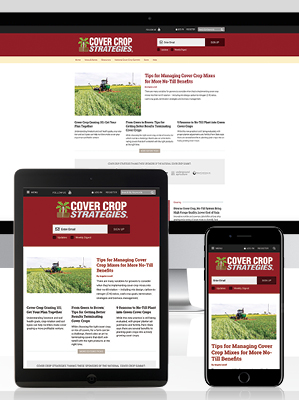As more is learned about the complexities of the soils serving as the basis for our civilization, it is becoming apparent to many that agricultural management practices need to change. Les Siler, a farmer from Fulton County, said farmers need to be intentional to improve the quality and health of their soil.
“Treat the soil like a living thing. You need to take care of it, keep it covered and not tear it up,” Siler said. “Along with the use of cover crops, having a multiple crop rotation is beneficial. “Crop diversity is very beneficial to the soil health and the soil life. Farmers also need to think about anything they do to the soil. If it is applying fertilizer or making a tillage pass. They need to think about how that impacts building the soil.”
Siler’s comments were a part of the first session of The Ohio State University’s College of Food Agricultural and Environmental Science web series titled “The dirt on soil health.” The first session focused on improving soil health. Siler was part of a three-farmer panel sharing their experiences, and offering advise to other farmers wanting to improve their soil health and profitability.
Nathan Brown, a farmer from Highland County on the panel, believes farmers need to allow the soil to function as a living part of the farm.
“Farmers need to grow the ‘herd’ of organisms below the soil surface, and help regenerate the soil. There are a number of factors that go into growing the ‘herd’ or organisms. The use of cover crops is one key to feeding the organisms. When we started growing cover crops, it was primarily to reduce erosion. We then saw the benefits in the soil health,” Brown said. “We need to make sure that the soil has the ability to function the way nature intended. There are a number of things in the soil that we need to work to keep alive and functioning. We want to recycle nutrients and raise the healthiest crops possible that will make it profitable for me and also for future generations.”
The decision of how and when to terminate a cover crop is another factor in improving soil health and increasing organic matter for Brown.
“I used to want to have everything sprayed to terminate it by the end of April every year,” Brown said. “I really got to thinking about the organic matter that I could be growing if I left that go. About four years ago we began to plant green and delayed our termination until after planting, and that has really been a game changer.”
When defining soil health from an organic standpoint, Matt Falb, a farmer from Wayne County, feels it involves the capacity of the soil to support plant growth. Falb has certified organic crop production and raises cattle on the farm.
“I learned from my Dad that soil health involves the chemical and physical side, and in the last decade we are learning more about the biological side. I just learned in a program the other day, that there are over 4 tons of living organisms in each acre of soil,” Falb said. “I think it starts with having a ground cover on our farm as long during the year as possible. That contributes to trying to grow our own nutrients and increasing organic matter. With organic farming, our synthetic inputs are restricted, so we need to find ways to grow our own nutrients. Weed control is also a challenge with organic operations, and having ground cover helps suppress weeds throughout the season.”
Organic crop production derives even more benefits from cover crop use.
“When we started to transition to organic production, we had to figure out how to grow our own nitrogen, and that led us to look into what legumes or other cover crops we could incorporate in,” Falb said. “Because we grow small grains for straw for our cattle, that provided a good window to establish cover crops in the fall for plow-down in the spring.”




Post a comment
Report Abusive Comment